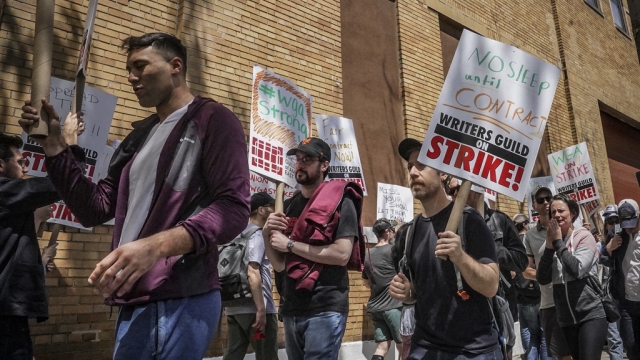There's a Russian cell phone commercial featuring Bruce Willis next to Fedha, a presenter with the Kuwait News and Kuwait Times. And like Bruce Willis in that cell phone commercial, Fedha isn't real.
Both figures were created through artificial intelligence, and proponents of the technology say it can help actors be in multiple places at once or cut down on labor costs for media companies and studios.
For workers and artists, however, that isn't something to celebrate.
"We are more than ever before being confronted with the reality of having to think about what protections need to be created, either through legislation or by court-made law, to allow people to feel safe in putting their image out there on these platforms, knowing that it's possible that they could then by grabbed and used by others," said Allen Secretov, an entertainment attorney.
AI, with its ability to recreate voices based on the work of professional voice actors, is already worrying those whose lives center around voicing audiobooks, animated series, games and commercials.
Earlier this year, an investigation from Scripps News' series "Next Level" found AI companies were also taking the work of real artists to build their datasets to generate work in the artists' styles.
That's worrying for the people who create storyboards and concept art for video games, films and television series.
"We're seeing a huge displacement of newer artists or entry-level artists being displaced because a lot of companies are more than willing to jump on these programs," said Jon Lam, a storyboard artist at Riot Games.
"All creative industries are probably going to hit this issue in one way or another," said Rachel Meinerding, producer and co-founder of Concept Art Association.
SEE MORE: Chasing the dream: One writer puts down her pen and picks up a sign
Entertainment labor organizations like the Writers Guild of America — which is currently on strike — and the Screen Actors Guild, are advocating for legal protections for their members, including those that would stop AI developers from exploiting "creative works ... without permission or compensation."
"With all the new technology, you know, you can bring Marilyn Monroe back from the grave, or Gary Cooper or Judy Garland, but of course, it's not that. It's a synthetic version of them, and a synthetic version of writing or acting is never going to be alive or unexpected," said actress Cynthia Nixon.
Negotiators for the Alliance of Motion Picture and Television Producers said the best stories come from the human experience, but also signaled its interest in using the technology, saying in a recent statement, "AI raises hard, important creative and legal questions for everyone."
"This is why SAG is so involved in this, because they can foresee a future where some of their members are at a loss or have not been able to commercially monetize their image and likeness because they gave that away earlier on in their career, and nobody wants that to happen," Secretov said.
This isn't to say that all artists are anti-AI, but they're simply concerned about the ways it can be used against them without legal and ethical boundaries.
"We're not anti-tech. This is not about humans vs. robots," Meinerding said."This is about doing it ethically."
AI educators like Molly Mahoney note that AI can be a valuable tool that can be used by writers and artists, but not as a replacement for them.
"There are people who are really, legitimately worried that they're going to be AI'ed out of their career or out of a job or something like that, right?" Mahoney said. "But what really is the possibility here is the way that we can use these tools in order to increase our productivity in order to give us more time for creation."
SEE MORE: What does Hollywood have to fear with deepfakes?
Trending stories at Scrippsnews.com




